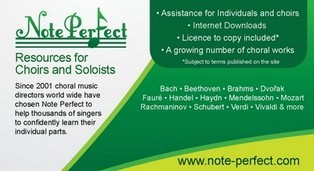Agnus Dei (arranged from Tomaso Giovanni Albinoni by R. Mather)
Choral
| Composer: | Tomaso Giovanni Albinoni | |
| Voicing: | 2 Part Choir, Solo and Organ or 2 Choirs, Solo and Organ | |
| Arranger: | R. Mather | |
| Words: | From John 1:29 |
Agnus Dei, qui tollis, pecata mundi, miserere nobis.
Agnus Dei, qui tollis, pecata mundi, miserere nobis.
Agnus Dei, qui tollis, pecata mundi, Dona nobis pacem.
Translation
Lamb of God, who takes away the sin of the world, have mercy upon us.
Lamb of God, who takes away the sin of the world, have mercy upon us.
Lamb of God, who takes away the sin of the world, grant us peace.
View or download the score (Two part choir, solo and organ)
View or download the score (Two Choirs, Solo and Organ)
Adagio in G minor for strings and organ is a piece supposedly based on a fragment from a Sonata in G minor by Tomaso Giovanni Albinoni which was found amongst the ruins of the old Saxon State Library, Dresden, after it was firebombed by the Allies during World War II.
The piece was repeatedly used as an underlying score for Orson Welles'' adaption of Kafka''s "The Trial". The piece has been used most notably in the 1981 Peter Weir film Gallipoli, which was themed around the famous World War I battle of the same name; and in the original version of the film Rollerball (1975). The piece was also used throughout the episode "Dragon''s Domain," from the first season of the mid-1970s sci-fi TV series Space: 1999, and later included on the expanded double-CD Year 1 soundtrack released in 1998. The Adagio has been used as background music in many television programmes and advertisements including the popular BBC sitcom, Butterflies and the 1982 anime film Arcadia of My Youth. The Adagio can be heard Steven Galloway''s novel, "The Cellist of Sarajevo". Adagio is also used as the introduction on the song, "Icarus Dream Suite Op.4," by Yngwie Malmsteen on his album, Rising Force. It is also used by The Doors on the album An American Prayer.
It is most commonly orchestrated for string ensemble and organ, or string ensemble alone.
This article is licensed under the GNU Free Documentation License. It uses material from the Wikipedia article "Metasyntactic variable".
"Adagio for Strings and Organ" by Baroque Ensemble Of Vienna
Comments
Please make comment on the score and music here.
- Keep to the topic of the music on this page. Be polite, comments are moderated
- Tell us where you have used this music and if your performance is published on the internet, please put a link to it in the website field
- Give performance advice/suggestions
- Ask others questions about performance techniques
- Please do not make requests for music on this page
- Your email address is not published
0
reviews
Our sponsors
Other Choral Music
